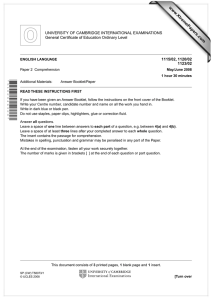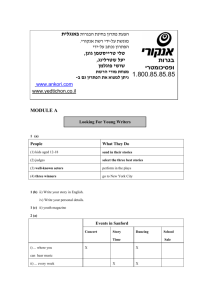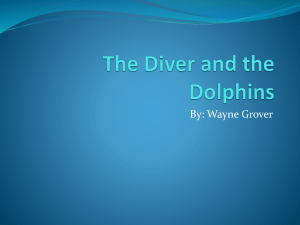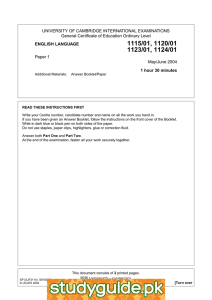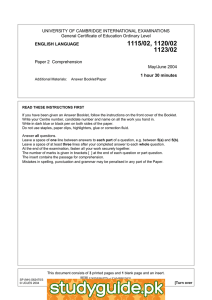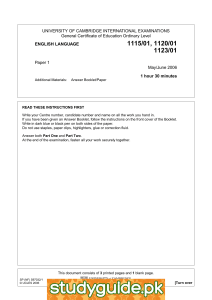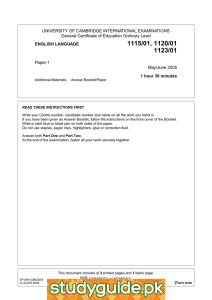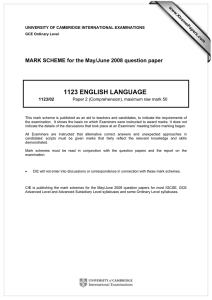UNIVERSITY OF CAMBRIDGE INTERNATIONAL EXAMINATIONS General Certificate of Education Ordinary Level 1123/02
advertisement
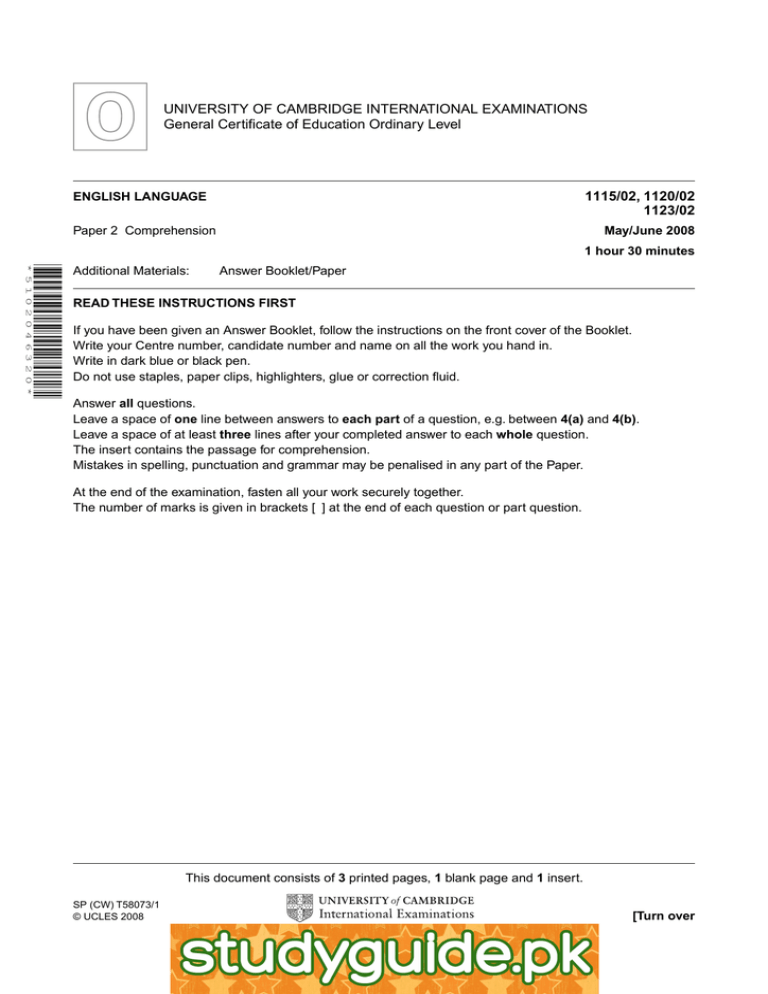
UNIVERSITY OF CAMBRIDGE INTERNATIONAL EXAMINATIONS General Certificate of Education Ordinary Level 1115/02, 1120/02 1123/02 ENGLISH LANGUAGE Paper 2 Comprehension May/June 2008 1 hour 30 minutes *5102046320* Additional Materials: Answer Booklet/Paper READ THESE INSTRUCTIONS FIRST If you have been given an Answer Booklet, follow the instructions on the front cover of the Booklet. Write your Centre number, candidate number and name on all the work you hand in. Write in dark blue or black pen. Do not use staples, paper clips, highlighters, glue or correction fluid. Answer all questions. Leave a space of one line between answers to each part of a question, e.g. between 4(a) and 4(b). Leave a space of at least three lines after your completed answer to each whole question. The insert contains the passage for comprehension. Mistakes in spelling, punctuation and grammar may be penalised in any part of the Paper. At the end of the examination, fasten all your work securely together. The number of marks is given in brackets [ ] at the end of each question or part question. This document consists of 3 printed pages, 1 blank page and 1 insert. SP (CW) T58073/1 © UCLES 2008 [Turn over www.xtremepapers.net 2 Read the passage in the insert and then answer all the questions which follow below. You are recommended to answer the questions in the order set. Mistakes in spelling, punctuation and grammar may be penalised in any part of the Paper. From paragraph 1: 1 Give one reason why, according to the writer, people love dolphins. [1] From paragraph 2: 2 (a) How can we tell that in some cultures dolphins were considered to be as important as human beings? [1] (b) What did people in many cultures believe could be the result of intentionally harming a dolphin? Answer in your own words. [2] From paragraph 3: 3 (a) In what two ways do dolphins use their ability to make sounds? Number your answers (i) and (ii). [2] (b) Give two reasons to explain why dolphins ‘leap high out of the water’. Answer in your own words. [2] (c) What single feature of the dolphins’ environment means that their eyesight is ‘often of little use’ in catching their prey? [1] From paragraph 4: 4 (a) According to the writer, what benefit do fishermen derive from the modern fishing methods? [1] (b) In what way are modern fishing methods ‘environmentally destructive’? [1] (c) Explain fully the benefits gained by fishermen who ‘take advantage of the tuna-dolphin bond’. [2] From paragraph 5: 5 (a) Why, even in the recent past, were fishermen less likely to be able to catch dolphins than fishermen today? [1] (b) Explain fully why in the past local fishermen did not need to kill dolphins for food. © UCLES 2008 1120/02/M/J/08 www.xtremepapers.net [2] 3 From paragraph 8: 6 Why is it unlikely that there will be a reduction in the number of dolphins killed in collisions with boats? [1] From paragraph 9: 7 What does the writer suggest by adding the word ‘even’ in line 67? [1] From paragraph 11: 8 In your own words, explain why, according to the writer, we have caused ‘tremendous harm to our environment’. [2] 9 From the whole passage: Choose five of the following words or phrases. For each of them give one word or short phrase (of not more than seven words) which has the same meaning that the word or phrase has in the passage. 1. 2. 3. 4. in vogue (line 1) delighted (line 6) distinction (line 22) overriding (line 38) 5. 6. 7. 8. deliberate (line 54) inadvertently (line 58) appalling (line 59) heartened (line 83) [5] 10 The passage describes the ways in which both sea dolphins and river dolphins are under threat in modern times. Using your own words as far as possible, summarise the difficulties and dangers encountered by river dolphins and the steps taken to protect them. USE ONLY THE MATERIAL FROM LINE 36 TO LINE 82. Your summary, which must be in continuous writing (not note form), must not be longer than 160 words, including the 10 words given below. Begin your summary as follows: River dolphins are under threat from many human activities because… © UCLES 2008 1120/02/M/J/08 www.xtremepapers.net [25] 4 BLANK PAGE Copyright Acknowledgements: Text © John May; The Greenpeace Book of Dolphins; Ebury Press; 1990. Permission to reproduce items where third-party owned material protected by copyright is included has been sought and cleared where possible. Every reasonable effort has been made by the publisher (UCLES) to trace copyright holders, but if any items requiring clearance have unwittingly been included, the publisher will be pleased to make amends at the earliest possible opportunity. University of Cambridge International Examinations is part of the Cambridge Assessment Group. Cambridge Assessment is the brand name of University of Cambridge Local Examinations Syndicate (UCLES), which is itself a department of the University of Cambridge. 1120/02/M/J/08 www.xtremepapers.net
